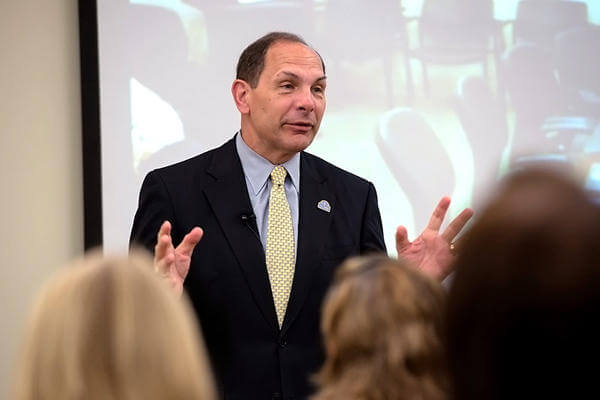As you transition from a military to civilian career, you've likely been taught the skills of preparing a resume, interviewing for a job, negotiating a salary and other tactical steps in getting a start on your next career.
But what about the skills of understanding your purpose? Have you learned how to identify and explore the parts of yourself that drive you to serve, commit, sacrifice and create a legacy for your life? Many of you have never taken the time to explore why you are here and how to maximize the value of your life outside of military service.
Department of Veterans Affairs Secretary Bob McDonald recently addressed attendees of the National Student Veterans of America Conference in Anaheim, California, telling the audience of thousands of veterans that, as they transition to their civilian life, it is paramount for them to discover their purpose and passion in life. He gave several examples of successful transitions that started when the service members began by exploring their motivations, drivers and sources of inspiration.
McDonald acknowledged that joining the ranks of the armed forces is a commitment to serve with honor and integrity. When envisioning their life after uniformed duty, he encouraged the audience to set a goal bigger than just earning a living. Instead, he asked attendees to see where they can extend their commitment to benefit society. Service doesn't have to stop when the uniform comes off, he shared.
McDonald also discussed the "blessing and the obligation of leadership," pointing out that once someone commits to serving in the military, they have been instilled with a sense of purpose and service unparalleled in other (non-military) careers. While some people might feel that their desire to serve is a burden, he encouraged veterans to look at the gift of being given tools and talents to lead others and create meaning for their lives.
Finding Your Purpose
What McDonald is speaking of is purpose. As a human being, your "purpose" is what guides you, gives your life meaning and helps you evaluate opportunities. When we can identify our purpose, our reason for being alive, we can create a life of intention and meaning. Mark Twain said, "What are the two most important days in your life? The day you were born, and the day you realize why." Do you know why you are here?
The process to uncover your purpose after a career in military service takes great introspection. It might feel uncomfortable and unnatural for you to examine your feelings, fears and goals, as you are conditioned to put the needs and feelings of others ahead of yourself.
Start by asking yourself:
- What do I find interesting and worthy?
- How would I spend my time if I didn't fear being judged?
- What would I sacrifice for?
- At the end of my life, what do I want to be remembered for?
- How will I make an impact on the world while I am alive?
Your answers to these questions will start the process of identifying your purpose. If you answer them truthfully and fully, you will see patterns and themes develop. Perhaps you see a desire to serve veterans, or maybe you are compelled to solve global issues. Possibly, you are inspired by leaders who sacrifice for the greater good of their teams. These insights help you create a sense of purpose for your life, and how you will influence, impact and serve others.
If You Are Passionate About Service
If service is your passion and purpose, don't ignore it. McDonald pointed out that a veteran can't and shouldn't leave it to chance that their desire to serve will be fulfilled in their civilian career. The civilian -- and particularly corporate -- world operates vastly differently from the military. To find a meaningful way to contribute and continue to serve others needs to be intentional. This might start by finding a job in a service field or doing volunteer work with a notable charity.
Knowing yourself is a first step to identifying a healthy, meaningful life after service. You have given your time, talents, expertise and skills to your country. Taking time to see what's best for you is a right you have earned.
As McDonald noted in his presentation: "What a blessing to have the obligation to have a positive impact on another human being!"
The Next Step: Get Veteran Jobs Tips
Looking for transition and veteran jobs tips? Military.com has you covered. Sign up for a free Military.com membership to have military news, updates and job resources delivered directly to your inbox.












